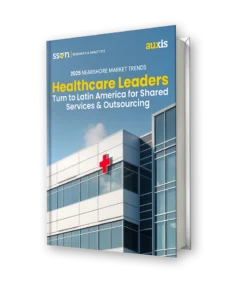In brief:
- Macroeconomic conditions have nearly half of U.S. hospitals facing negative margins, while labor shortages and inefficient processes slow revenue cycle management activities.
- The rise of cloud-based healthcare revenue cycle outsourcing to nearby regions with highly educated populations has made healthcare organizations more comfortable outsourcing judgment-intensive processes.
- As bottom-line pressures mount, healthcare companies can maintain their own wellness by reaping the benefits of outsourcing revenue cycle management: reduced costs, accelerated cash flow, decreased hiring challenges, streamlined operations with AI-powered automation, and more.
Strategic healthcare revenue cycle outsourcing is mission-critical to helping healthcare organizations maintain their own wellness, working to alleviate bottom-line pressures and secure proper reimbursement for their services.
But mounting pressures beyond healthcare enterprises’ control – combined with advancing technology and greater opportunities for collaboration and delivery of complex work through nearshoring – have healthcare companies increasingly looking to capture the benefits of outsourcing revenue cycle management (RCM).
Inflation and rising healthcare costs have left about 40% of U.S. hospitals facing negative operating margins in early 2024, according to Kaufman Hall’s latest data. Making matters worse, 58% of healthcare practices struggle to fill vital revenue cycle management roles – causing a third to experience reimbursement delays, states a 2024 Medical Group Management Association (MGMA) report.
Eighty percent of healthcare practices said chronic revenue cycle staffing shortages present significant risks to their organization, including increased claim denials.
At the same time, the rise of cloud-based, nearshore revenue cycle outsourcing in locations with highly educated populations has made healthcare organizations more comfortable entrusting third-party providers to perform time-sensitive, judgment-intensive RCM processes.
Nearly 80% of healthcare providers now leverage RCM outsourcing to help manage tasks like patient registration, coding, billing, claims, or accounts receivable workflows.
Source: Guidehouse 2024 Revenue Cycle Management Report
And the market is expected to steadily grow as healthcare leaders cite outsourcing as the top strategy for overcoming their staffing challenges.
Why leading healthcare organizations are outsourcing revenue cycle management
Let’s examine the biggest benefits of outsourcing revenue cycle management for the healthcare industry: reducing costs, accelerating cash flow, mitigating hiring challenges, streamlining operations with AI-powered automation, and more.
1. Reduce rising healthcare costs.
It’s no secret that the U.S. has the highest healthcare costs worldwide – and medical expenses are increasing faster than inflation. According to the American Hospital Association’s (AHA) 2024 Costs of Caring report, total hospital expenses grew by 5.1% in 2024, significantly outpacing the overall inflation rate of 2.9%.
Spending on non-core administrative processes like medical billing and insurance-related activities accounts for a quarter of national healthcare industry expenditures. Leveraging the resources, automation technology, and streamlined best practices of reputable revenue cycle management outsourcing providers to perform this work enables healthcare organizations to cut costs without impacting patient care.
As revenue cycle departments struggle to recruit staff, the ability to outsource revenue cycle management processes to a quality partner alleviates the significant expenses and hiring challenges stemming from high turnover and labor shortages. Nearshoring to Latin America, for example, reduces labor costs by an average 30-50% compared to hiring similar resources in the U.S., while productivity and efficiency gains from automation and optimized operations can yield another 10-20% savings.
2. Improve operational efficiency and cash flow.
Improving cash flow remains a top priority for CFOs, especially in the face of ongoing inflation and economic challenges (FTI Consulting 2024 Global CFO Survey).
But traditionally, RCM is a time-consuming process, fraught with errors, frustration, and complications. Many healthcare organizations lack the time or expertise to perform a comprehensive assessment and create streamlined, documented processes that drive prompt payment while mitigating inefficiency and risk.
Unresolved claim denials alone cost hospitals an average of $5 million annually, according to a 2024 Medical Economics report. As bottom-line pressures mount, that’s up to 5% of net patient revenue.
Outsourcing revenue cycle management to a quality provider offers immediate access to advanced tools, proven best practices, and specialized expertise. This enables healthcare organizations to optimize revenue cycle operations, reduce administrative burdens and errors, accelerate turnaround times, and boost revenue streams.
Amid ever-changing patient volumes and reimbursement models, companies that outsource RCM also gain the flexibility to scale resources up and down – eliminating hiring headaches or the burden of under-utilized teams.
3. Access AI automation and data-driven decisions.
While 75% of organizations, including healthcare companies, rank AI as a top investment priority, only 25% are seeing significant AI value. Quality outsourcers can help healthcare organizations bridge the gap – providing instant access to advanced automation, AI, and real-time analytics that enable healthcare leaders to generate actionable business insights, improve operational efficiency, lower costs, and drive meaningful transformation.
The U.S. healthcare system could save $20 billion annually by fully automating key administrative transactions like insurance verification, prior authorization, claims submission, and payment processing.
Source: 2024 Council for Affordable Quality Healthcare (CAQH) Index
This shift would alleviate burdens on providers, reduce delays in patient care, improve patient satisfaction, and streamline operational efficiency across the healthcare ecosystem.
For example, a fully automated claims status inquiry costs $11.71 less than the same manual transaction in the medical industry and $10.92 less in the dental industry. Extrapolating those savings over the number of times those transactions are performed daily creates the potential for significant savings.
Consider this: Auxis reduced average patient delivery time by over 20% for a leading medical supplier by automating RCM processes like insurance verification and prior authorization follow-ups. Besides improving speed to revenue, the Auxis solution created a valuable differentiator for the supplier in the rehabilitation market, where patients rely on access to products for their daily lifestyles.
Read our blog to learn more about healthcare revenue cycle management automation opportunities: Healthcare RCM Automation: Benefits, Challenges, & Use Cases.
4. Mitigate compliance burdens and risk.
From HIPAA to medical coding standards, heavy regulations surround healthcare administrative processes. Errors like coding mistakes, filing incomplete claims, missed filing deadlines, and failure to verify insurance can have serious consequences – risking claim denials or fraud allegations that trigger reputational damage, fines, and even criminal penalties.
Medical billing errors remain a major concern, with approximately 80% of medical bills containing inaccuracies, according to industry data. Furthermore, 38% of healthcare providers experience denial rates of 10% or higher (Experian Health 2024 State of Claims Report).
Alarmingly, up to 65% of these denied claims are never resubmitted, leading to considerable financial losses for healthcare organizations.
Outsourcing RCM to the right partner brings deep expertise in navigating the complexities of healthcare regulations and policies. Quality providers maintain stringent compliance frameworks that ensure security, data privacy, and adherence to healthcare billing and coding guidelines.
Healthcare revenue cycle outsourcing also helps reduce risk by enforcing compliance best practices. For example, automation can catch coding errors by reviewing claims before submission.
5. Strengthen security amid surging cyberattacks.
The rise of cloud-based BPO has been a key catalyst for outsourcing RCM. It enables healthcare companies to develop agile global delivery models and reduce costs while safeguarding patient data with secure electronic health record access and storage.
But built-in cloud security is only a first step. With a virtual goldmine of data and abundance of aging technology, healthcare surpassed financial services as the #1 target for cyberattacks in 2024 – and has suffered the highest data breach costs of any industry since 2011 (IBM 2024 Cost of a Data Breach Report). The average cost of a data breach for healthcare companies in 2024: $9.77 million.
This intensifying threat landscape underscores the urgent need for advanced, layered cybersecurity strategies.
Outsourcing RCM to a quality partner delivers instant access to the best-in-class security products, governance, and best practices that many healthcare companies lack. An alarming 73% of healthcare providers store data on legacy systems, which are often rife with security gaps, the World Economic Forum reports.
For example, Auxis takes a stringent approach to security and HIPAA compliance, including:
- Adopting healthcare clients’ security processes, systems, and controls when robust measures are in place.
- Accessing client systems through a controlled connection like a VPN managed by the client.
- Storing data and documents in client-controlled locations, with no information stored locally.
- Implementing robust local infrastructure and access controls, with a SOC 1 Type 2 report for verification.
For clients requiring onsite teams, Auxis can implement a “clean room” in its service delivery centers, creating a secure, segregated space with controlled access and video surveillance monitoring. The use of data capture instruments like cell phones, cameras, and even pen and paper are strictly prohibited. Computers are also locked down, ensuring users can only access client-managed sites and cannot print or connect storage devices.
These same controls are applied to remote teams, with high-performing security software managing connection and control of devices.

Why Auxis: Top-tier revenue cycle outsourcing talent in your time zone
The healthcare RCM outsourcing market is expected to grow rapidly as new economic uncertainty demands cost-effective services.
But many healthcare organizations find that working with teams on the other side of the world complicates service delivery, as traditional offshore solutions often lack the higher-level talent and cultural, language, and time zone alignment needed to support complex, time-sensitive healthcare processes.
Partnering with a quality nearshore provider in Latin America delivers agility, innovation, and highly skilled resources in your time zone – providing the collaboration and experience needed to navigate complex healthcare processes and design tailored solutions.
Interested in learning more about the benefits of outsourcing RCM to Latin America? Schedule a consultation with our revenue cycle management experts today! You can also visit our resource center for more RCM tips, strategies, and success stories.
Frequently Asked Questions
What is revenue cycle management (RCM) and why is it essential for healthcare organizations?
What are the key benefits of outsourcing revenue cycle management instead of managing it in-house?
How does outsourcing RCM improve compliance and reduce risk?
Is outsourcing RCM secure for sensitive healthcare data?
Why are nearshore markets becoming top destinations for revenue cycle management outsourcing?



